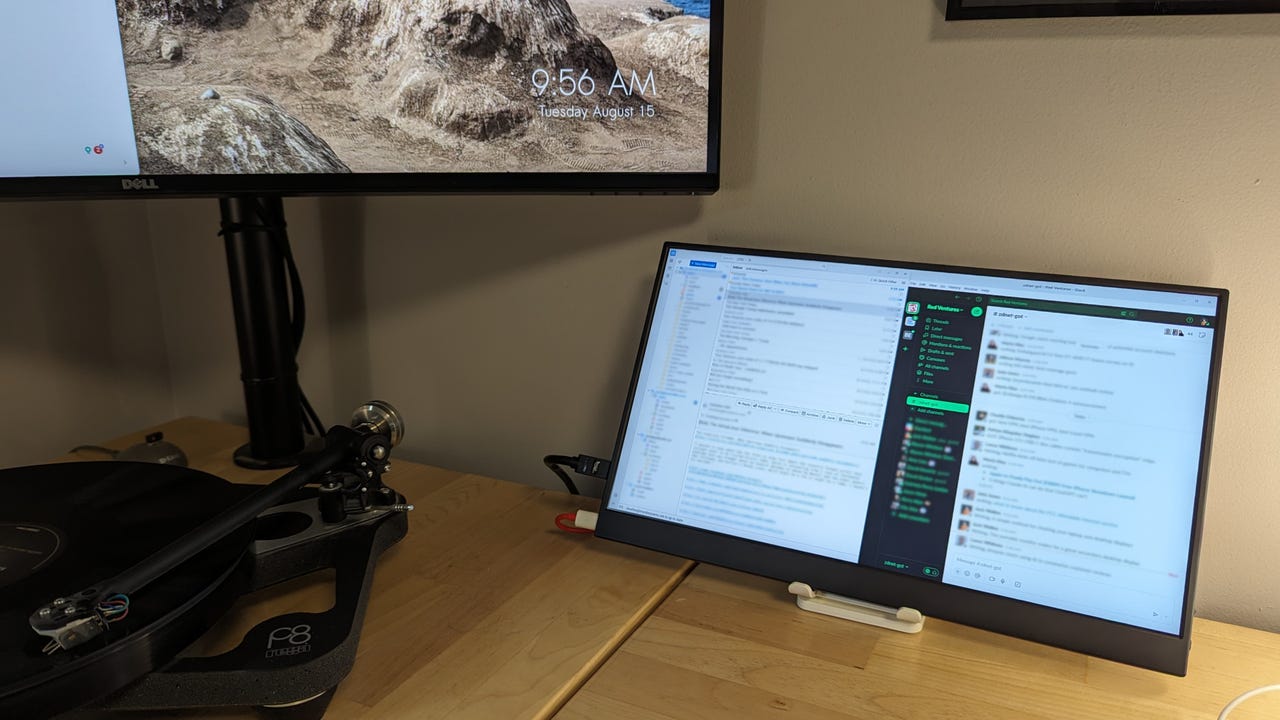































 Jack Wallen/
Jack Wallen/ For the longest time, I used two 24-inch monitors as my primary desktop setup. When those two monitors died an untimely death, I opted to part ways with my usual setup and go with a 34-inch curved Dell display, which cost me roughly$1,000 and has served me well for quite some time.
Also: This is by far the most convenient power strip I've ever used
However, even with 34 inches of screen real estate, my workflow tends to require a second monitor. And slapping two 34-inch monitors on my desk isn't exactly a viable solution (especially given I have two bookshelf speakers on my desk).
Recently, I was sent a 16.1-inch portable monitor to review, so I connected theHongo 144Hz portable gaming monitor alongside my Dell and was left pleasantly surprised by the sheer visuals given how relatively affordable the thing was.
This portable gaming monitor can serve a number of purposes and does so with a bright and crisp display and a relatively affordable price.
View at AmazonNot only has the extra screen made a huge difference, but the monitor is a significant improvement over what past portable monitors I've used. It's clearer, brighter, and less prone to flicker than my portable monitor of the past. In fact, the Hongo monitor is considerably brighter than my Dell 34-inch, which, again, was nearly$1,000.
Also: This Dell monitor doubles as a swiveling, tablet-like touchscreen
The difference is quite stark, with the whites on the Hongo being crisper and more pronounced than the Dell. To be fair, the Dell monitor is at least seven years old, so it makes sense that a new monitor (especially one geared toward gaming) would be brighter.
Enough with the small talk, let's take a look at the specs for the Hongo portable gaming monitor.
One thing to keep in mind is that the HDMI connector cannot provide power to the display. For that, you must use one of the USB-Type C connectors.
On this side of the monitor, you'll find a single mini USB connector, the menu dial, a power button, and the 3.5mm headphone jack.
Jack Wallen/I've tried the Hongo portable gaming monitor in both landscape and portrait orientation (on Ubuntu Budgie) and it works to perfection. I prefer landscape mode, but mostly because of cable routing. Either way you turn the display, it works great as a secondary monitor.
Also: Best portable monitors: Compare models from Duex, Lenovo, and more
I opted to forgo the included stand and use an old, low-profile phone stand I had sitting around. This configuration allows me to place the portable monitor very close to my primary monitor, so I can easily see what's happening on both displays.
I also connected the Hongo display to my Nintendo Switch (via the USB Type-C cable) and it worked perfectly. My test was with the game Hollow Knight. Although the speakers do sound a bit tinny, you can always connect a pair of headphones for better sound.
You'd be hard-pressed to find a better portable (or secondary) monitor for the price. TheHongo is bright, crisp, and easily set up to use in just about any configuration you might need.
If you're looking to simplify your desktop workflow (and don't want two large monitors at your desk) or you want a portable monitor that can be connected to various types of devices, the Hongo portable gaming monitor might be just what you need.
 Hot Tags :
Our process
Home & Office
Smart Office
Office Hardware & Appliances
Hot Tags :
Our process
Home & Office
Smart Office
Office Hardware & Appliances